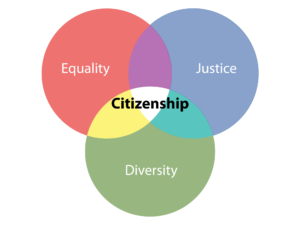Back to: Civic Education JSS1
Welcome to class!
In today’s class, we shall be talking about the types of citizenship. Please enjoy the class!
Types of Citizenship

Citizenship is a complex concept that manifests in various forms, reflecting the diversity of political, legal, and cultural systems across the globe. In this class, we will explore the different types of citizenship, examining the nuances that arise from varying legal frameworks, political structures, and historical contexts.
Types of Citizenship
Birthright Citizenship
Birthright citizenship is acquired automatically by individuals born within the territory of a particular country, regardless of the nationality of their parents.
Naturalized Citizenship
Naturalized citizenship is acquired through a legal process, often involving residency requirements, language proficiency, and a demonstrated commitment to the values of the host country.
Dual Citizenship
Dual citizenship allows individuals to be citizens of two or more countries simultaneously, often requiring adherence to the laws and responsibilities of each.
Full Citizenship
Full citizenship encompasses the complete set of rights, privileges, and responsibilities granted to individuals within a specific political entity.
Limited Citizenship
Limited citizenship may restrict certain rights or privileges based on factors such as gender, race, or other criteria, leading to unequal treatment within a society.
Active Citizenship
Active citizenship involves proactive participation in civic life, including voting, community engagement, and advocacy for social and political change.
Passive Citizenship
Passive citizenship refers to individuals who may hold legal citizenship but are less engaged in civic activities and political processes.
Digital Citizenship
In the digital era, individuals are increasingly recognized as digital citizens, involving responsible and ethical behavior in online spaces, respecting digital rights, and contributing positively to digital communities.
Historical Citizenship
Historical citizenship may refer to individuals whose citizenship status is influenced by historical events, territorial changes, or shifts in political alliances.
Cultural Citizenship
Cultural citizenship emphasizes the role of shared culture, language, and heritage as defining aspects of citizenship, particularly in diverse societies.
The diverse types of citizenship highlight the complexity and adaptability of this concept across different contexts. As societies evolve, citizenship continues to be shaped by legal, political, cultural, and digital factors, reflecting the ever-changing nature of our interconnected world. Understanding these types of citizenship provides insights into the varied ways individuals connect with their communities and the broader global landscape.
We have come to the end of today’s class. I hope you enjoyed the class!
In the next class, we shall be discussing Rights and Duties of Citizens.
In case you require further assistance or have any questions, feel free to ask in the comment section below, and trust us to respond as soon as possible. Cheers!
Question Time:
- How does birthright citizenship contribute to the notion of an inclusive society, and what implications does it have for individuals born within a specific country?
- Can you discuss the legal processes involved in acquiring naturalized citizenship, and how do these requirements vary across different countries?
- In what ways does dual citizenship impact the rights and responsibilities of individuals, and how might it influence their sense of identity and connection to multiple nations?
